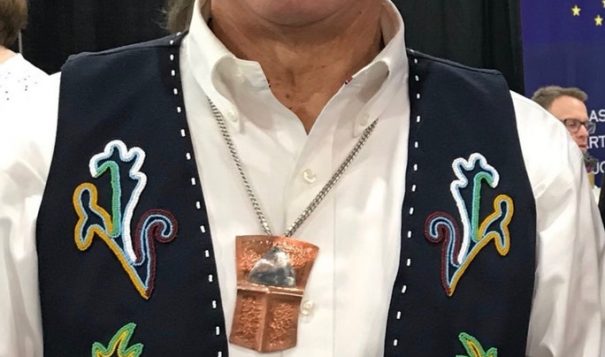 Lt. Gov. Byron Mallott will not be on Tuesday's ballot. He is collecting signatures with Gov. Bill Walker to go straight to the November ballot. (Mark Trahant photo)
Lt. Gov. Byron Mallott will not be on Tuesday's ballot. He is collecting signatures with Gov. Bill Walker to go straight to the November ballot. (Mark Trahant photo)
Indian Country Today
Alaska voters start to answer a big question in their primary election Tuesday: Is there a role for independent leadership? Or is the two-party framework the only one that works today?
This story starts four years ago. Byron Mallott, Tlingit, won the Democratic party’s primary and was the nominee for governor. He faced the Republican incumbent, Sean Parnell, and an independent Bill Walker.
The 2014 election was critical to Alaska Natives because the Parnell administration was hostile to most of the issues that mattered to people who lived in the villages, even basic services such as public safety.

So while the idea of electing the first Alaska Native governor was appealing, it was not enough. The bigger concern was making certain that Parnell did not win re-election.
That’s when the math took over. It was unlikely, actually nearly impossible, for either Mallott or Walker to defeat Parnell in a three-way race. The Republican had an movable block of supporters.
So Mallott and Walker decided to team up. Walker would be the candidate for governor and Mallott would run for lieutenant governor. The plan worked. Barely. Walker and Mallott were elected by a margin of 1.6 percent, a little more than 4,000 votes out of more than 244,000 cast.
The Walker-Mallott administration sent a signal immediately that Alaska Native issues would get a new day. And that’s what happened.
One of the governor’s first appointments was Valerie Nurr’araaluk Davidson,Yupik, as the commissioner of Health and Social Services. This one agency controls more than a billion dollars a year and is the state’s largest operating program. The Walker administration pushed for Medicaid expansion which added significant resources to the Alaska Native medical system (and showed other states why that’s good business because the increased health care insurance coverage of Alaska Natives is a cost that’s reimbursed by the federal government).
The new administration replaced a contentious relationship between the state and tribal communities with one that was more supportive of tribal sovereignty. Last year, for example, the state of Alaska signed a compact that opened up child welfare management to tribal governments and community programs.
But none of that is on the ballot. Yet.

Walker and Mallott will go straight to the November ballot and likely face a Democrat, former U.S. Senator Mark Begich, who is running with Debra Call, Dena’ina, and a member of the Knik Village and Cook Inlet Tribal Councils. Begich and Call are unopposed Tuesday.
Republicans also will make their choice, however, on Tuesday. There are two main candidates: Former state Senator Mike Dunleavy and former Lt. Gov. Mead Treadwell.
So come November there will probably be a four-way race between a Republican, Walker, Begich and a Libertarian. A poll last month showed Mike Dunleavy leading with 36 percent support, and Walker at 28 percent, and Begich had 22 percent.
Begich said he faced a similar three-way split when he was elected mayor of Anchorage many years ago. “I understand the angst over Dunlevy. I have no interest in ensuring that Dunleavy is the next governor, no interest,” Begich told Homer radio station KBBI.
But the idea of a nonpartisan, independent leadership in Alaska is not only about the governor’s office. Both the state Senate and state House have Republicans who caucus with Democrats and vice versa.
And then other Republicans are being challenged in the primary for, well, reasons that are unclear.
Two years ago two Republicans (and 3 independents) opted to align with the Democrats and elect Bryce Edgmon, Aleut, as the Speaker of the House. (The first Alaska Native to ever do that.)
But one of the Republicans who did not do that was Charisse Millett, Inupiaq, who became the House minority leader. She is conservative. And yet she faces a primary challenge from Josh Revak, an Army combat veteran and former aide to Sen. Dan Sullivan. His campaign is essentially a call to drill, drill, drill.
In Juneau, Rob Edwardson, Tlingit-Haida, is running as an independent for a state House seat. He faces Democrat Andi Story in Tuesday’s primary. He told the Juneau Empire that he would like to see the state come up with a more comprehensive budget plan that might even include a tax increase. Edwardson serves on the Juneau City Assembly.
In Juneau, James Hart, Tlingit, is running in a crowded primary for the state House. But this race is really a general election because no Republican filed for the seat, so the winner is likely to hold office.
Most of the Alaska Native candidates who are running for the legislature are unopposed in Tuesday’s primary.
Another question ahead is the primary mechanism itself. More than 100,000 voters were told to clear up their voting registration and that might cause confusion at the polls. An initiative passed by voters requires the Division of Elections to register qualified Alaskans to vote when they apply for a check from the state’s oil-wealth fund. But when “opt out” notices were sent to addresses on their applications, there were addresses that did not match.
The state says election results could be slow as a result. Then the primary won’t resolve the bigger question about the role for independents in Alaska. That answer might come in November when the next governor is elected or in January when the legislature convenes and elects its next leaders.
Mark Trahant is editor of Indian Country Today. He is a member of the Shoshone-Bannock Tribes. Follow him on Twitter – @TrahantReports
Email: mtrahant@IndianCountryToday.com

